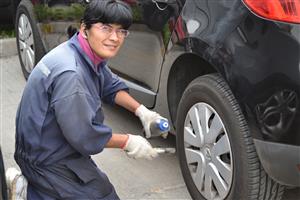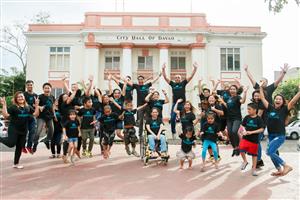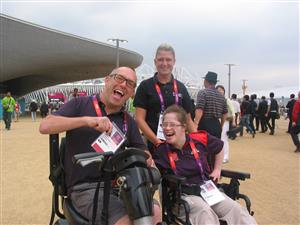Search Results
Search
Filter results
Advanced Filters
Your search returned 883 Solutions
-
Accessible London funds work that improves access to buildings of the civil society and increases disabled people's participation in arts and sporting opportunities.
The Accessible London program allows voluntary and community organisations to get free advice and funding for improving accessibility to their buildings and services. This program provides funding for access consultancy, specialist disability staff, disability training, physical and sensory building improvements.
City Bridge Trust, Providing access to buildings of civil society, United Kingdom -

Ecological car washing service employing a majority of people with disabilities
SecoChile is an eco-washing service for cars, where most of the employees are people with disabilities. There are 45 registered (corporate) customers, serviced by 300 employees nationwide. The income is 15 per cent above the minimum wage in Chile. In 2019 a home-washing service was implemented.
SecoChile, Seco Chile, Chile -
The right to youth education
The law enables young people with special needs to attain personal, social and vocational competencies through a three-year youth education. The training is based on a person-centred curriculum. It can take place in different schools or in the form of work experiences, and is completed with a certificate.
Danish Ministry of Children and Education, The right to youth education, Denmark -
Accessibility assessments of urban areas using 114 indicators
PPAS AU is a paper-based assessment form to review the level of ease by which persons with disabilities, the elderly, and children can move through public spaces such as a pavements, crossings, and buildings. PPAS AU has been used in six neighbourhoods in and around Montréal since the start of the initiative in 2015.
Logic Society, PPAS AU Audit of Safe Active Pedestrian Potential, Canada -

Training persons with disabilities in the Philippines to work as digital freelancers
The 10-week programme includes demand-driven digital skills training, work-based learning, and employment support. Virtualahan also employs its own graduates to work as online outsourcing professionals. Since 2015 more than 400 people have graduated from the programme and 78 per cent have found employment.
Virtualahan Inc., Virtualahan, Philippines -
Adding universal design in ICT student curricula
The project uses active learning approaches to ensure that all students studying technology gain knowledge on the universal design of ICT. Active learning involves student-centred teaching methods and adaptive and individualized support. At the graduate level universal design is a requirement for all technology students
Oslo and Akershus University, Norway -
Providing accessible books and learning materials to blind students
The project uses globally accepted standards and open source technology to convert books into audio formats, while also partnering with other organizations to make existing audiobooks available. Students can access either e-books or audio versions of books, making it a cost-effective solution for accessing educational reading material.
YPSA - Young Power in Social Action, Audiobook Programme, Bangladesh -

NATIONAL E-ACCESSIBILITY POLICY
Qatar’s National eAccessibility Policy faces the fact that Arabic did not feature in assistive technology and helps to reduce a number of the most severe barriers. It lays the foundation for an accessible ICT ecosystem by introducing assistive technology solutions in Arabic, providing support for people with disabilities and training for professionals.
Qatari Ministry of Information and Communication Technology of Qatar, Comprehensive eAccessibility policy, Qatar -
CETRAM is a community-based organisation which helps to find personalised solutions for individual needs in regard to wellness and health. It offers technical aids and assistive technology at low cost at home.
CETRAM aims to include educational and technological assistance as well as social, analytical and political elements. An interdisciplinary team identifies and finds solutions to problems in regard to the health system that violate the fundamental rights of the people with disabilities involved, especially intellectual ones.
CETRAM - Center of Movement Disorders, Customising health solutions, Chile -
AMAC provides a cost-effective, replicable, scalable, holistic business model which provides accessible solutions and research for corporate, governmental and non-profit entities supporting post-secondary individuals with disabilities
AMAC offers a one-stop shop for digital and alternative media textbooks, cost-effective reuse of digital libraries, remote captioning and downloadable assistive technology software to quickly access materials at universities, colleges, government agencies, non-profits, and corporations. Over 300,000 textbook title records are updated weekly.
AMAC - Accessibility Solutions & Research Center, Digital Library with more than 300,000 textbooks, United States of America
- Page 1
- Page 2
- Page 3
- Page 4
- Page 5
- Page 6
- Page 7
- Page 8
- Page 9
- Page 10
- Page 11
- Page 12
- Page 13
- Page 14
- Page 15
- Page 16
- Page 17
- Page 18
- Page 19
- Page 20
- Page 21
- Page 22
- Page 23
- Page 24
- Page 25
- Page 26
- Page 27
- Page 28
- Page 29
- Page 30
- Page 31
- Page 32
- Page 33
- Page 34
- Page 35
- Page 36
- Page 37
- Page 38
- Page 39
- Page 40
- Page 41
- Page 42
- Page 43
- Page 44
- Page 45
- Page 46
- Page 47
- Page 48
- Page 49
- Page 50
- Page 51
- Page 52
- Page 53
- Page 54
- Page 55
- Page 56
- Page 57
- Page 58
- Page 59
- Page 60
- Page 61
- Page 62
- Page 63
- Page 64
- Page 65
- Page 66
- Page 67
- Page 68
- Page 69
- Page 70
- Page 71
- Page 72
- Page 73
- Page 74
- Page 75
- Page 76
- Page 77
- Page 78
- Page 79
- Page 80
- Page 81
- Page 82
- Page 83
- Page 84
- Page 85
- Page 86
- Page 87
- Page 88
- Page 89